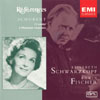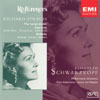Schubert Lieder
Two cherishable souvenirs of Schwarzkopf at her finest: incomparable with Fischer in Schubert, and in Strauss, for many, supreme
View record and artist detailsRecord and Artist Details
Composer or Director: Franz Schubert
Label: Références
Magazine Review Date: 3/2001
Media Format: CD or Download
Media Runtime: 67
Mastering:
Mono
ADD
Catalogue Number: 567494-2

Tracks:
| Composition | Artist Credit |
|---|---|
| An die Musik |
Franz Schubert, Composer
Edwin Fischer, Piano Elisabeth Schwarzkopf, Soprano Franz Schubert, Composer |
| Im Frühling |
Franz Schubert, Composer
Edwin Fischer, Piano Elisabeth Schwarzkopf, Soprano Franz Schubert, Composer |
| Wehmut |
Franz Schubert, Composer
Edwin Fischer, Piano Elisabeth Schwarzkopf, Soprano Franz Schubert, Composer |
| Ganymed |
Franz Schubert, Composer
Edwin Fischer, Piano Elisabeth Schwarzkopf, Soprano Franz Schubert, Composer |
| (Das) Lied im Grünen |
Franz Schubert, Composer
Edwin Fischer, Piano Elisabeth Schwarzkopf, Soprano Franz Schubert, Composer |
| Gretchen am Spinnrade |
Franz Schubert, Composer
Edwin Fischer, Piano Elisabeth Schwarzkopf, Soprano Franz Schubert, Composer |
| Nähe des Geliebten |
Franz Schubert, Composer
Edwin Fischer, Piano Elisabeth Schwarzkopf, Soprano Franz Schubert, Composer |
| (Die) Junge Nonne |
Franz Schubert, Composer
Edwin Fischer, Piano Elisabeth Schwarzkopf, Soprano Franz Schubert, Composer |
| An Silvia |
Franz Schubert, Composer
Edwin Fischer, Piano Elisabeth Schwarzkopf, Soprano Franz Schubert, Composer |
| Auf dem Wasser zu singen |
Franz Schubert, Composer
Edwin Fischer, Piano Elisabeth Schwarzkopf, Soprano Franz Schubert, Composer |
| Nachtviolen |
Franz Schubert, Composer
Edwin Fischer, Piano Elisabeth Schwarzkopf, Soprano Franz Schubert, Composer |
| (Der) Musensohn |
Franz Schubert, Composer
Edwin Fischer, Piano Elisabeth Schwarzkopf, Soprano Franz Schubert, Composer |
| (6) Moments musicaux |
Franz Schubert, Composer
Edwin Fischer, Piano Franz Schubert, Composer |
Composer or Director: Richard Strauss
Label: Références
Magazine Review Date: 3/2001
Media Format: CD or Download
Media Runtime: 78
Mastering:
Mono
ADD
Catalogue Number: 567495-2

Tracks:
| Composition | Artist Credit |
|---|---|
| (4) Letzte Lieder, '(4) Last Songs' |
Richard Strauss, Composer
Elisabeth Schwarzkopf, Soprano Otto Ackermann, Conductor Philharmonia Orchestra Richard Strauss, Composer |
| Capriccio, Movement: ~ |
Richard Strauss, Composer
Elisabeth Schwarzkopf, Soprano Otto Ackermann, Conductor Philharmonia Orchestra Richard Strauss, Composer |
| Arabella, Movement: Das war sehr gut. |
Richard Strauss, Composer
Anny Felbermayer, Soprano Elisabeth Schwarzkopf, Soprano Harald Pröglhöf, Bass Josef Metternich, Baritone Lovro von Matacic, Conductor Murray Dickie, Tenor Philharmonia Orchestra Richard Strauss, Composer Walter Berry, Bass-baritone |
| Arabella, Movement: ~ |
Richard Strauss, Composer
Anny Felbermayer, Soprano Elisabeth Schwarzkopf, Soprano Harald Pröglhöf, Bass Josef Metternich, Baritone Lovro von Matacic, Conductor Murray Dickie, Tenor Philharmonia Orchestra Richard Strauss, Composer Walter Berry, Bass-baritone |
| Arabella, Movement: Und jetzt sag' ich adieu |
Richard Strauss, Composer
Anny Felbermayer, Soprano Elisabeth Schwarzkopf, Soprano Harald Pröglhöf, Bass Josef Metternich, Baritone Lovro von Matacic, Conductor Murray Dickie, Tenor Philharmonia Orchestra Richard Strauss, Composer Walter Berry, Bass-baritone |
Author: Alan Blyth
That said, the doubters should listen to this recital with Edwin Fischer, one of the greatest discs of Schubert singing ever committed to disc. As I found so often in her recitals dating back to Oxford days in 1950, annoyance with the occasional mannerism soon gives way to wonder at such an amazingly eager response to every facet of a song and its setting. And truly inspired by Fischer, who at once overawed and inspired the singer, as JBS relates in his notes, she throws caution utterly to the winds, forgets herself and astonishes us in accounts of Die junge Nonne, Ganymed and Gretchen am Spinnrade that have seldom if ever been surpassed for vocal consistency and sheer concentration – though it is a pity the singer makes a break in the final, long phrase of Ganymed.
Fischer, one of the noblest Schubert interpreters of his or any time, is obviously a partner in a thousand and on his own confirms his stature in the legendary 1950 recording of the Moments musicaux better transferred here than ever before – as are the Lieder. So this is a CD no Schubertian can do without.
Nor can Straussians be without the companion disc. Although many consider the 1965 stereo remake of the Four Last Songs, under George Szell, superior, I have always preferred this 1953 mono version, and listening to it again find no reason to change my mind. Schwarzkopf was here at her absolute peak of vocal accomplishment: her tone soars above the orchestra with the utmost ease and radiance. With Ackermann and the Philharmonia in sympathetic support, this version stands with those of Lisa della Casa, Sena Jurinac and Gundula Janowitz as wonders of recording history (though don’t overlook Schwarzkopf’s live 1956 reading with Karajan – it’s even more compelling in some ways than this one).
We are consoled for not having the soprano’s complete Arabella by the substantial extracts reissued here, in which she shows her understanding of Arabella’s complex character. Della Casa may have supplied a more golden tone, but Schwarzkopf matches her in terms of verbal acuity and phrasing. Metternich distinguishes himself with his virile, clear baritone in the Act 2 duet with Mandryka, where the voices blend so gratefully. Felbermayer makes a lively Zdenka and it’s good to have brief souvenirs of Dickie and Berry, two Vienna stalwarts of the day. This Strauss recital is crowned by Schwarzkopf’s glorious account of Countess Madeleine’s soliloquy, the close of Capriccio, an interpretation on a par with those of della Casa, Janowitz (both coupled with their Four Last Songs, listed above) and Elisabeth Soderstrom (EMI, 7/82 – nla). Nobody today, not even Felicity Lott, comes near to matching the eloquence of all three. Mataeic’s thoughtful conducting completes pleasure in this generously filled, satisfying reissue, but why should it be on References rather than on Great Recordings of the Century? And why no texts for the operatic items?'
Discover the world's largest classical music catalogue with Presto Music.

Gramophone Digital Club
- Digital Edition
- Digital Archive
- Reviews Database
- Full website access
From £8.75 / month
Subscribe
Gramophone Full Club
- Print Edition
- Digital Edition
- Digital Archive
- Reviews Database
- Full website access
From £11.00 / month
Subscribe
If you are a library, university or other organisation that would be interested in an institutional subscription to Gramophone please click here for further information.




